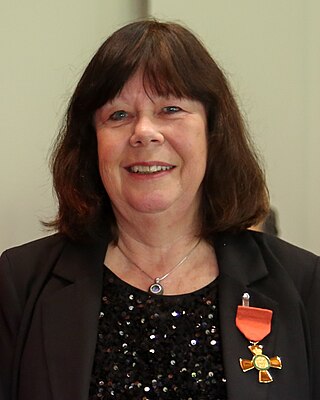
Motor neuron diseases or motor neurone diseases (MNDs) are a group of rare neurodegenerative disorders that selectively affect motor neurons, the cells which control voluntary muscles of the body. They include amyotrophic lateral sclerosis (ALS), progressive bulbar palsy (PBP), pseudobulbar palsy, progressive muscular atrophy (PMA), primary lateral sclerosis (PLS), spinal muscular atrophy (SMA) and monomelic amyotrophy (MMA), as well as some rarer variants resembling ALS.

Riluzole is a medication used to treat amyotrophic lateral sclerosis and other motor neuron diseases. Riluzole delays the onset of ventilator-dependence or tracheostomy in some people and may increase survival by two to three months. Riluzole is available in tablet and liquid form.

Frontotemporal lobar degeneration (FTLD) is a pathological process that occurs in frontotemporal dementia. It is characterized by atrophy in the frontal lobe and temporal lobe of the brain, with sparing of the parietal and occipital lobes.

β-Methylamino-L-alanine, or BMAA, is a non-proteinogenic amino acid produced by cyanobacteria. BMAA is a neurotoxin. Its potential role in various neurodegenerative disorders is the subject of scientific research.

Amyotrophic lateral sclerosis (ALS), also known as motor neurone disease (MND) or Lou Gehrig's disease in the United States, is a rare, terminal neurodegenerative disorder that results in the progressive loss of both upper and lower motor neurons that normally control voluntary muscle contraction. ALS is the most common form of the motor neuron diseases. ALS often presents in its early stages with gradual muscle stiffness, twitches, weakness, and wasting. Motor neuron loss typically continues until the abilities to eat, speak, move, and, lastly, breathe are all lost. While only 15% of people with ALS also fully develop frontotemporal dementia, an estimated 50% face at least some minor difficulties with thinking and behavior. Depending on which of the aforementioned symptoms develops first, ALS is classified as limb-onset or bulbar-onset.
Christopher Edward Dennistoun Shaw MBChB, MD, FRACP, FRCP (Hon), FMedSci, FANA is Professor of Neurology and Neurogenetics at the Institute of Psychiatry, Psychology and Neuroscience, King's College London. He is also Head of the Department of Basic and Clinical Neuroscience, Director of the Maurice Wohl Clinical Neuroscience Institute at King's College London and an Honorary Consultant Neurologist and Neurogeneticist at King's College Hospital. His major research interest is in the genetic, molecular and cellular basis of motor neuron diseases such as amyotrophic lateral sclerosis (ALS).
Research on amyotrophic lateral sclerosis (ALS) has focused on animal models of the disease, its mechanisms, ways to diagnose and track it, and treatments.
Gilles J. Guillemin is an Australian neuroscientist. He received the Ordre national du Mérite in 2019 in recognition of his work in medical research. He was awarded a Member of the Order of Australia in 2021.

Lynette Joy Tippett is a New Zealand professor of psychology at the University of Auckland, specialising in neurodegenerative diseases.
The Motor Neurone Disease New Zealand Charitable Trust (MNDNZ) is an organisation that focuses on improving access to care, research and campaigning for those people living with or affected by motor neurone disease (MND) in New Zealand. MND is also known as amyotrophic lateral sclerosis (ALS) or, in the United States, Lou Gehrig's Disease. MNDNZ is the only national charity in New Zealand that promotes research into the disease and provides support for people affected by MND.

Bronwen Jane Connor is a New Zealand academic. She is a professor of pharmacology at the University of Auckland, where she is head of the Neural Reprogramming and Repair Lab.
Stephanie Margaret Hughes is a New Zealand molecular neurobiologist, and is a full professor at the University of Otago, specialising in gene therapy for the fatal childhood disorders known as Batten disease.

Janet Lynn Fanslow is a New Zealand academic, and is a full professor at the University of Auckland, specialising in researching the prevention, prevalence and consequences of family violence.
Cathy Maree Stinear is a New Zealand clinical neuroscientist, and is a full professor at the University of Auckland, specialising in stroke rehabilitation and techniques for prediction of stroke recovery. She was appointed Chair of the Neurological Foundation in 2021, and is the first woman to chair the organisation.

Fiona May Cram is a New Zealand social psychologist and researcher, of Ngāti Pāhauwera descent. In the 2019 Queen's Birthday Honours, Cram was appointed a Member of the Order of New Zealand, for services to Māori health and education.

Natalie Joan Gauld is a New Zealand pharmacist, lecturer and researcher. She was appointed an Officer of the New Zealand Order of Merit for services to pharmacy and health in 2023.
Susan Mary Bennett Morton is a New Zealand epidemiologist, and is a full professor of public health at the University of Technology Sydney, specialising in longitudinal studies of public health. In 2019, Morton was appointed a Member of the New Zealand Order of Merit for services to epidemiology and public health research.

Jacqueline Lindsay Bay is a New Zealand science educator, based at the University of Auckland's Liggins Institute. In 2017 Bay was appointed a Member of the New Zealand Order of Merit for services to science and education.

Heather Anne Came-Friar is a New Zealand activist, academic and anti-racism scholar, and is an adjunct professor at Victoria University of Wellington, and an anti-racism consultant. In 2023 Came-Friar was appointed a Member of the New Zealand Order of Merit for services to Māori, education and health.

Louise Frances Basford Nicholson is a New Zealand neuroscientist, and is professor emerita at the University of Auckland, specialising in molecular mechanisms common to neurodegenerative diseases. In 2021, Nicholson was appointed a Companion of the New Zealand Order of Merit for services to neuroscience and education.












